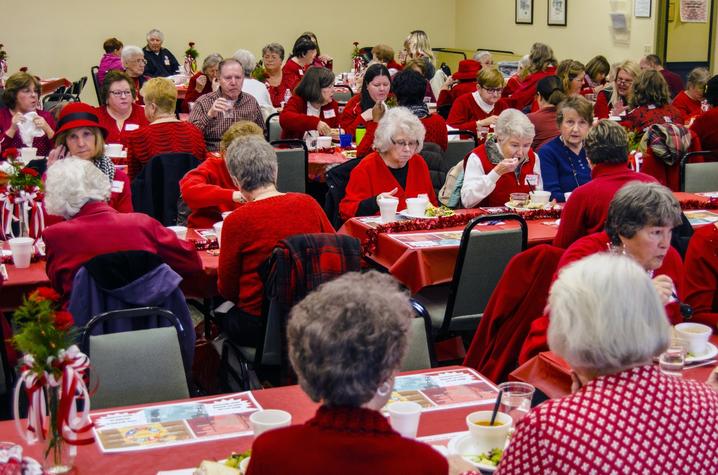Big Blue Goes Red in February

LEXINGTON, Ky., (Feb. 22, 2018) — In myriad ways, University of Kentucky Cooperative Extension has opened its Big Blue heart in February to celebrate and promote American Heart Month. In luncheons awash in red, in all-day knitting sessions and at health fairs, Cooperative Extension spread the important message: take care of your heart.
The Centers for Disease Control and Prevention lists heart disease as the leading cause of death among both men and women. Risk factors include a family history, high blood pressure, high cholesterol, diabetes, being overweight, poor diet, physical inactivity, smoking and excessive alcohol use. Many of those factors can be controlled by making healthy choices, and since one of Cooperative Extension’s missions is to improve human health and well-being, it’s a natural fit for its staff to reach out to communities to educate and support heart health.
More than 100 women — all in varying shades of red — and a smattering of men showed up at the Shelby County Extension office for Go Red for Heart Health, a celebration of the American Heart Association’s National Wear Red Day. The event comprised a heart-heathy lunch, door prizes, speeches and health exhibits.
Shelbyville Mayor Thomas Hardesty read the city’s official Heart Day Proclamation, and state Rep. Rob Rothenburger spoke about some of the health legislation currently before the Kentucky Assembly. Keynote speaker, Sharon Jamison, a local nurse practitioner, spoke about ways people could decrease their risk for heart disease.
It wasn’t just about speeches, though. The program was personal for many people in the room. About half had either been affected by heart disease themselves or through a loved one. Family and consumer sciences (FCS) agent Sheila Fawbush asked the participants to write down three ways they promised to take care of their hearts. One copy went home with them. The other copy went into a self-addressed envelope, which Fawbush plans to mail back to them in a month, as a gentle reminder to stick to their goals.
“It’s so much of what we do in extension, supporting the community, helping folks take better care of themselves and their families,” Fawbush said. “There’s a real sense of community and support in an event like this. It’s fun, and it’s also informative.”
That same day in Pulaski County, FCS agent Edith Lovett and Brenda Williamson, the nutrition education assistant, handed out educational materials and heart healthy recipes to hundreds of people at a health fair in Somerset Mall. Lake Cumberland Hospital spearheads the annual fair, and Pulaski County Extension never hesitates to be part of it.
“Any way I can help my community to improve their health, I’m happy to do it,” said Lovett, who is on the organizing committee. “If we can get people to eat better and watch their diets and exercise, it’s a day well spent.”
FCS agent Mary Hixson and four knitters and crocheters from Garrard County jumped in the car about a week later and drove to Fayette County, where they joined other crafters in making red hats for newborns. Organized by Liz Kingsland, an FCS agent in Fayette County, the program was part of the wider American Heart Association’s Little Hats, Big Hearts program, developed to raise awareness of congenital heart defects. For five hours, the crafters transformed bright skeins of red yarn into cute little hats, which Kingsland will deliver to maternity departments in area hospitals. Though the knitters and crocheters were certainly enjoying themselves, Kingsland said the purpose was to get everyone thinking about heart health, from crafters to new parents.
“That includes good nutrition, that includes activity, that includes all the things you can do to create a healthy lifestyle for you and your children,” she said.
Joey Maggard, executive director of the Central Kentucky Chapter of the American Heart Association, and Mike Turner, the chapter’s special events director, dropped in on the group to thank them for their work. According to Maggard, congenital heart disease is still the No. 1 birth defect in babies.
“Anything we can do to draw attention to heart disease in kids and congenital heart defects is brilliant and very well-received,” he said. “This program is one of those grass-roots movements that will help not only families of kids who are struggling with congenital heart defects, it also brings attention to the cause to those families who are not affected.”
Receiving a diagnosis like that for a newborn can feel frightening and isolating to new parents. Often such a diagnosis brings with it one or more operations down the line for that child.
“When they see something like this (red hat) bringing awareness and concern and support to families who are dealing with newborns with a heart defect, it gives them a boost,” Turner said.
Kathy Owens and Donna Bruszewski spent the day churning out tiny crocheted caps. Bruszewski did it because she enjoys helping people. Owens used to be a cardiovascular nurse with UK HealthCare, so she has seen the results of heart disease and knows that being proactive is the best thing you can do for yourself.
“There are certain things you can control,” she said. “Things like weight and salt, the kind of diet, the amount of activity, all of those kinds of things you can adjust to decrease your chances of having heart trouble.”
All the agents were quick to recommend visiting a doctor for a health exam first. After that, however, Cooperative Extension offices in every Kentucky county have free programs that teach and support a healthy lifestyle.
“We have lots of things to offer at local extension offices,” Lovett said. “Check us out.”




